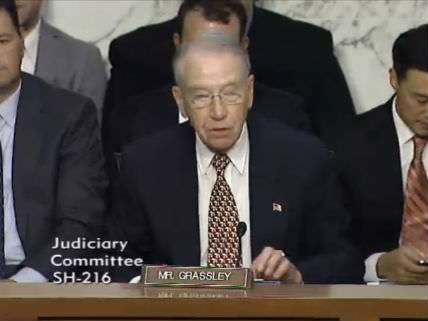Grassley Says Marijuana Prohibition Is 'Based on What Science Tells Us'

At this week's Senate Judiciary Committee hearing on marijuana legalization, Sen. Charles Grassley (R-Iowa) made a statement about the Controlled Substances Act that highlights the intellectual bankruptcy of the prohibitionist position:
Marijuana's continued presence on the statute's list of illegal substances isn't based on whim. It's based on what science tells us about this dangerous and addictive drug. There's a process that exists to move drugs on and off that list, but the scientific standard to do that hasn't yet been met for marijuana.
To say that marijuana prohibition is based on a whim may give the legislators who originally enacted it too much credit. Shortly before the House of Representatives approved a federal ban on marijuana in 1937, the Republican minority leader, Bertrand Snell of New York, confessed, "I do not know anything about the bill." The Democratic majority leader, Sam Rayburn of Texas, educated him. "It has something to do with something that is called marihuana," Rayburn said. "I believe it is a narcotic of some kind."
Seventy-six years later, the scientific basis for keeping marijuana illegal is not much more rigorous, despite what Grassley seems to think. In 1970 Congress put marijuana on Schedule I of the Controlled Substances Act, supposedly reserved for drugs with a high abuse potential and no accepted medical value that cannot be used safely even under a doctor's supervision. Marijuana meets none of those criteria, especially when you compare it with less restricted drugs such as morphine, cocaine, amphetamines, barbiturates, and benzodiazepines, all of which are on Schedule II or lower. Even marijuana's main psychoactive ingredient, delta-9 tetrahydrocannabinol (THC), is on Schedule III, provided it is produced in a pharmaceutical plant rather than a cannabis plant.
Last Friday marked the 25th anniversary of a ruling in which the Drug Enforcement Administration's own chief administrative law judge, Francis Young, concluded that marijuana did not meet the criteria for Schedule I. Young declared it "abundantly clear" that marijuana has "a currently accepted medical use" and called it "one of the safest therapeutically active substances known to man." He was overruled by DEA Administrator John Lawn, and all of Lawn's successors, including the current one, have stubbornly maintained the absurd position that marijuana is less useful and more dangerous than the drugs in Schedules II and below. The Obama administration's defense of marijuana's Schedule I status may be the most striking way in which the president has broken his promise to disentangle science from politics.
Yet Grassley, who displayed a similar respect for reality when he crusaded against the apparently mythical menace of candy-flavored meth, claims the DEA's persistent refusal to reschedule marijuana is "based on what science tells us about this dangerous and addictive drug." We may have been better off when members of Congress openly admitted they were legislating out of ignorance.


Show Comments (47)